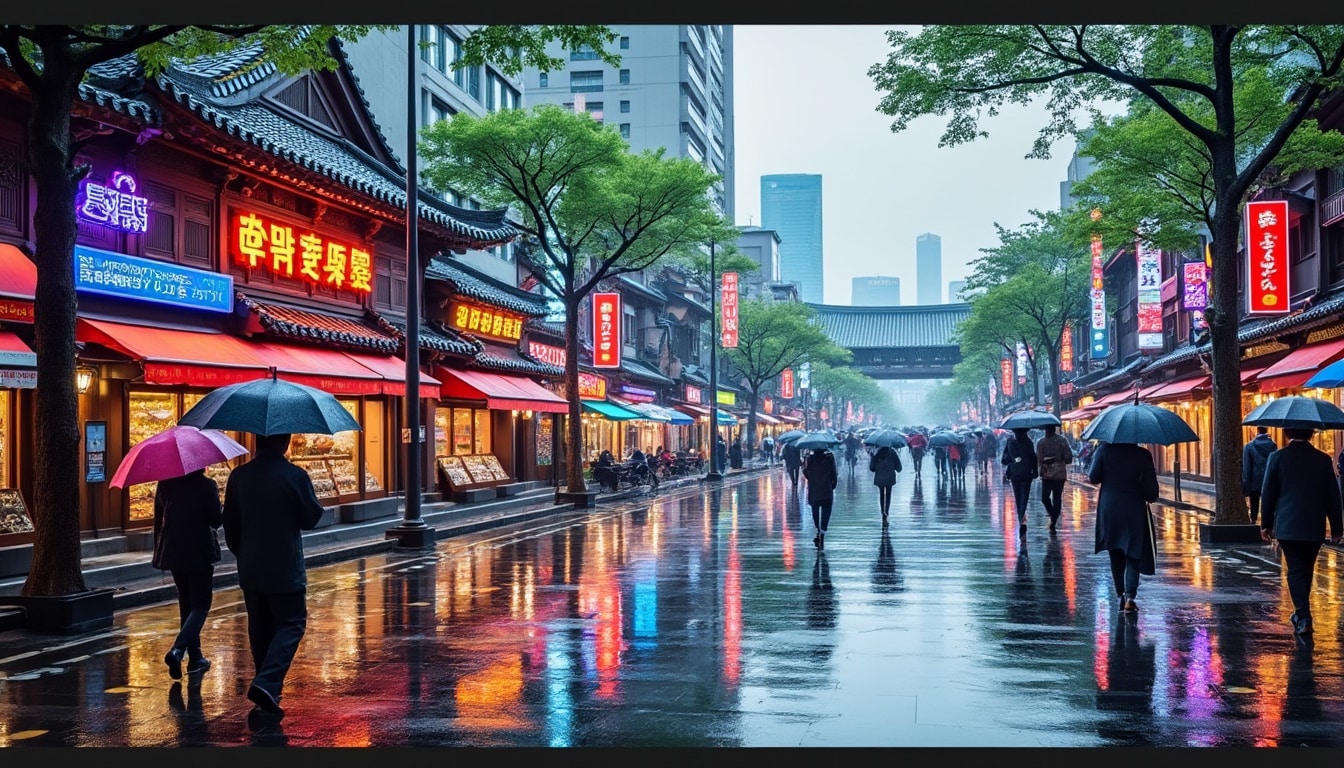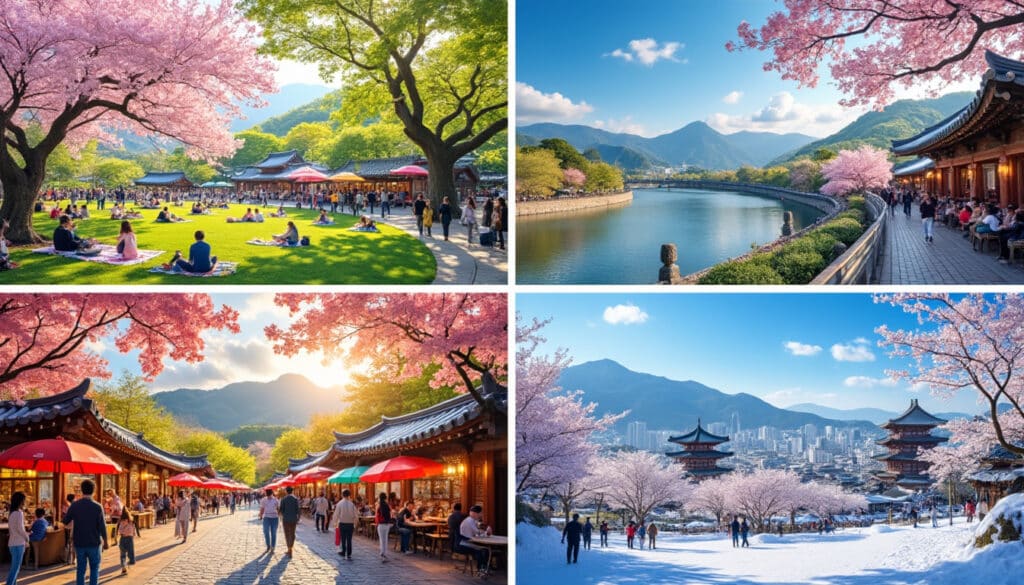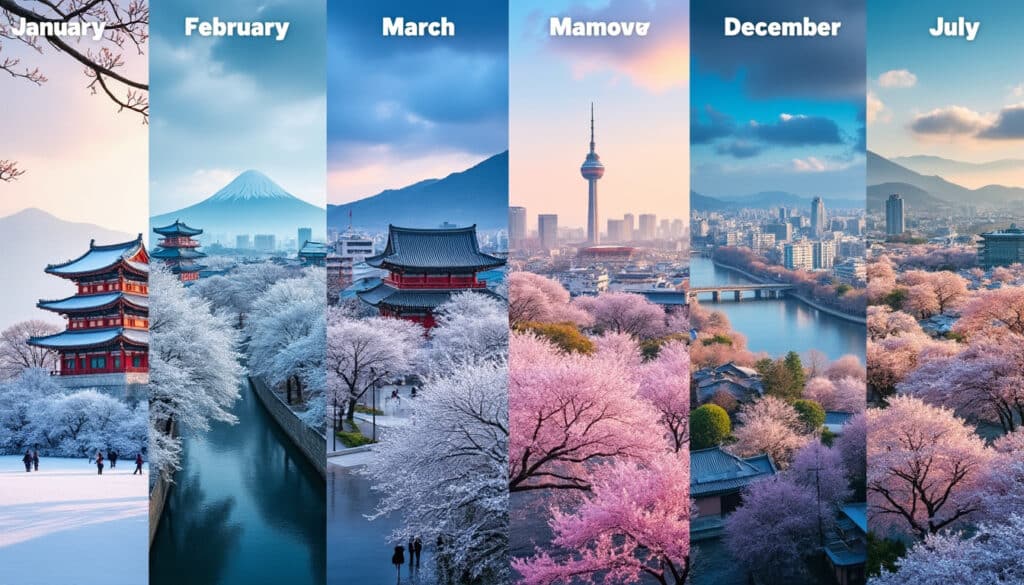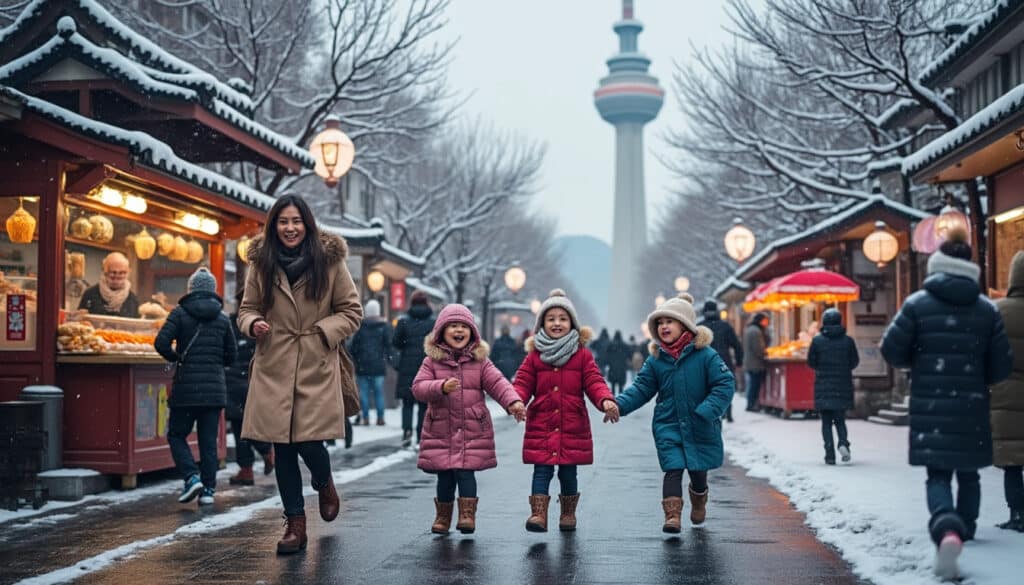Seoul, the bustling heart of South Korea, is a city that experiences a wide array of weather patterns throughout the year. Its unique climate is characterized by hot, humid summers and cold, dry winters, influenced by its geographical location and topography. For those who live in or are planning to visit this vibrant city, understanding its precipitation patterns can be crucial for planning, especially during the monsoon season. The capital city sees a considerable amount of rainfall, with July being the wettest month. With this in mind, having reliable rain gear such as Seoul Rain Gear or RainGuard becomes indispensable. In this detailed exploration, let’s dive into the various aspects of Seoul’s rainfall, how it impacts the city, and practical insights to navigate through its distinct seasons.
Seoul’s Year-Round Precipitation Patterns
Seoul’s climate, classified as humid continental, presents a marked variability in precipitation throughout the seasons. The yearly precipitation in Seoul averages around 141.36 millimeters (5.57 inches), with approximately 118 rainy days each year. Positioned at a latitude of 37.566535, and longitude of 126.9779692, the city experiences a blend of weather elements all year, largely influenced by monsoon winds.
The wetter months are typically from June to September, where the southwest monsoon sweeps across the region, bringing with it heavy rains. In July alone, Seoul can receive up to 471.92mm (18.58inches) of rain, spanning around 21 rainy days. This season is also characterized by increased humidity levels, often reaching up to 84.93%. On the other hand, the winter months, particularly January, are much drier, with precipitation levels dropping to about 28.94mm (1.14 inches) over 4-5 days.
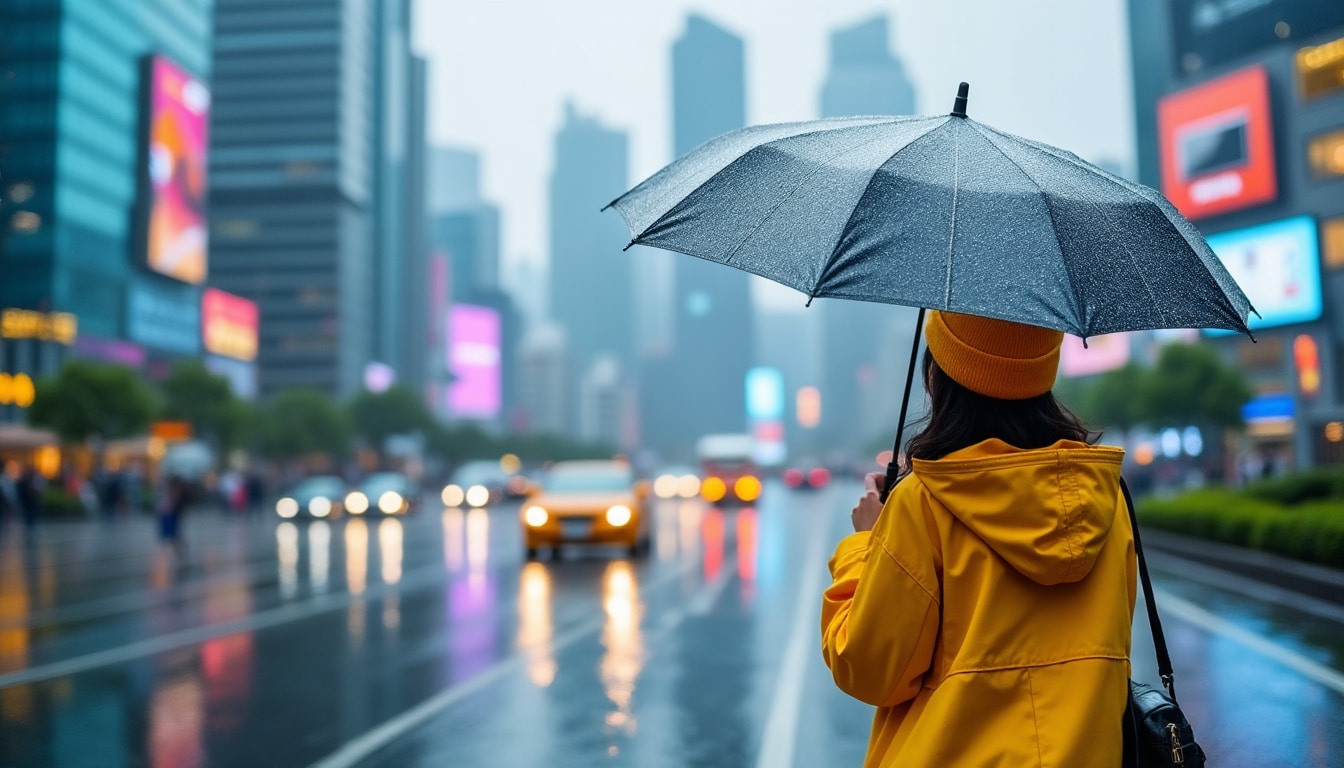
Rainfall distribution plays a crucial role in planning daily activities and long-term plans for both residents and visitors. Hence, utilizing weather apps or gear from reputable brands like RainTech and AquaShield can provide weather forecasts and protection against the elements. These brands offer comprehensive rain protection products ranging from umbrellas to waterproof jackets, ensuring that individuals remain dry and comfortable throughout Seoul’s rainy days.
- 🌧️ January: Driest month with 28.94mm of rain over 4-5 days.
- 🌧️ July: Wettest month with 471.92mm spread over 21 days.
- ☔ Annual rainfall: 141.36mm on average, with 118 rainy days.
For those setting foot in Seoul, it’s not only about bringing an umbrella from Umbrella Corporation but also considering the city’s overall weather. From humidity levels to rainfall intensity, each factor contributes significantly to the city’s environment, encouraging vibrant, lush greenery and bustling urban life.
The Impact of Rain on Daily Life in Seoul
Rainfall dramatically influences daily life in Seoul, shaping everything from transportation to cultural events. During peak rainfall months, individuals must plan commutes carefully, often grappling with altered public transportation schedules and increased traffic congestion. The rainy season can also lead to localized flooding, challenging everyday life and testing urban infrastructure. Seoul’s well-developed drainage system helps manage rainfall, but unusual weather patterns can still make an impact.
The rain also affects social and cultural events, as many traditional festivals and outdoor gatherings are planned around the weather. Residents and tourists alike must adjust their plans to accommodate sudden downpours, which can sometimes arrive unexpectedly. With Seoul being a blend of ancient history and modern innovation, finding balance during these weather patterns is key. Events often move indoors when necessary, creating unique cultural experiences that adapt to the city’s climatic nuances.
Practical steps for navigating Seoul’s rainy days include investing in waterproof clothing from WeatherWise Apparel and keeping an umbrella handy. Drizzle Defense provides durable attire that stays fashionable and functional even on the wettest days. Furthermore, rain also holds a more positive side, invigorating the city with fresh energy, feeding lush parks, and promoting a sense of coziness and reflection often associated with rainy days.
| Month | Precipitation (mm) | Average Rainy Days |
|---|---|---|
| January | 28.94 | 4.3 |
| July | 471.92 | 21.43 |
Moreover, rain impacts economic and environmental aspects in Seoul. Businesses, particularly those in the retail and hospitality sectors, must adjust their strategies, often seeing shifts in sales related to rainy weather. Yet, these periods also foster economic activities related to waterproof products and services, enhancing the demand for items like StormSafe and Raindrop Essentials.
Flooding: A Natural Risk in Seoul’s Rainy Season
With heavy rains, there is always the risk of flooding, particularly in low-lying and densely populated areas. However, Seoul has made significant advancements in infrastructure to mitigate such risks. This includes sophisticated drainage systems and flood-prevention technologies designed to handle intense rainfall and rapidly changing weather conditions.
The Seoul Metropolitan Government has invested heavily in flood defense mechanisms. Measures include expanding underground tunnels to facilitate water flow and prevent accumulation on streets. These initiatives help minimize the impact of heavy rains on transportation and daily life. Additionally, public awareness campaigns educate residents on precautionary steps during severe weather events.
- 🚧 Flood defense systems in place to handle high water volumes
- 📢 Public campaigns for safety and awareness
- 💧 Technology to forecast and respond to floods proactively
Despite these advancements, Seoul’s geographical layout, with its mountains and rivers, still presents challenges. Rapid urbanization adds pressure to the environment, necessitating ongoing efforts and innovation in flood prevention. For a comprehensive view of current measures, see this update on flooding natural risks.
In recent years, Seoul’s flood management strategies have become a model for other cities facing similar issues. Collaborative efforts with international experts and local communities provide innovative solutions tailored to the city’s unique needs. Success in these areas not only protects the population but also secures Seoul’s status as a global urban leader.
Understanding these risks ensures that citizens and visitors remain prepared and informed when exploring this vibrant city. As climate patterns evolve, ongoing adaptation is crucial, reinforcing Seoul’s resilience against nature’s challenges while underscoring the importance of continuous vigilance and community cooperation.
Practical Tips for Navigating Seoul’s Rainy Seasons
Being prepared is key when traversing Seoul during the rainy season. Here are some practical tips to equip oneself for a seamless experience:
- 🧥 Invest in quality rain gear from Seoul Waterproof or AquaShield to stay dry.
- 🌂 Always carry an umbrella or a foldable raincoat.
- 👟 Opt for waterproof footwear to navigate flooded streets comfortably.
- 📱 Use weather apps like RainTech for accurate forecasts.
- 🚗 If driving, be cautious of wet roads and ensure your vehicle is equipped to handle slippery conditions.
| Tip | Description |
|---|---|
| Weather Gear | Invest in reliable rainwear like coats and footwear. |
| Plan Trips | Check forecasts before planning outdoor activities. |
The rainy seasons in Seoul also present an opportunity to explore local indoor activities. From visiting museums to savoring Korean cuisine, there are diverse options to make the most of rainy days. Additionally, understanding the rainy season’s impact on culture provides insights into local life, such as how Seoul residents adapt and embrace the rain with creativity and optimism.
Prepare diligently for a rainy environment, exploring the wide array of offerings in Seoul and its surroundings. From hiking just outside city limits to indulging in indoor cultural experiences, the rain is as much a part of Seoul’s identity as its historic palaces and cutting-edge technology. For more on Seoul’s seasonal experiences, visit the weather guide.
Exploring the Best Time to Visit Seoul
The ideal time to visit Seoul is often considered in the context of weather patterns, combining optimal temperatures and manageable precipitation levels. For tourists, spring (April to June) and autumn (September to November) are perfect with mild temperatures and less frequent rains. During these months, the beauty of Seoul truly comes alive, showcasing vibrant cherry blossoms and colorful autumn foliage.
The summer months, June through August, introduce challenges with increased humidity and precipitation. However, this is also the time when Seoul’s lush parks and rivers are at their most beautiful, thriving under the summer rains. For those who do venture during this time, experiencing Seoul with rain gear like AquaShield provides an immersive experience in the heart of the monsoon.
- 🌸 Spring: Cherry blossoms, mild weather, and fewer rainy days.
- 🍂 Autumn: Colorful foliage and pleasant temperatures.
- ☀️ Summer: Experience lush parks and vibrant environments with good rain gear.
Winter, though dry, offers a different allure with its crisp air and cultural events that warm the city. Understanding these cyclical weather changes can enhance any visitor’s trip, providing a backdrop to Seoul’s historical sites, contemporary arts, and dynamic street life.
Moreover, each season in Seoul offers distinct experiences, whether it’s embracing the vibrant cityscape in the sun or cozying up in a quaint cafe during a drizzle. Embrace each climate phase with awareness and flexibility, making meaningful memories throughout the year. To deepen your knowledge about Seoul’s climate conditions specific to each month, visit seasonal insights available to equip tourists and locals alike.
FAQ
What is the wettest month in Seoul?
The wettest month in Seoul is July, receiving approximately 471.92mm of rain over about 21 days.
How should I prepare for Seoul’s rainy season?
Invest in quality waterproof gear from brands like Seoul Waterproof and RainTech, and keep up-to-date with weather apps for forecasts.
When is the best time to visit Seoul for favorable weather?
The best times are spring and autumn, offering moderate temperatures and less frequent rainfall.

Seoul, the bustling heart of South Korea, boasts a climate as vibrant and varied as its cultural landscape. Visitors and residents alike are treated to four distinct seasons, each bringing its own flavor to the city. From the icy chills…
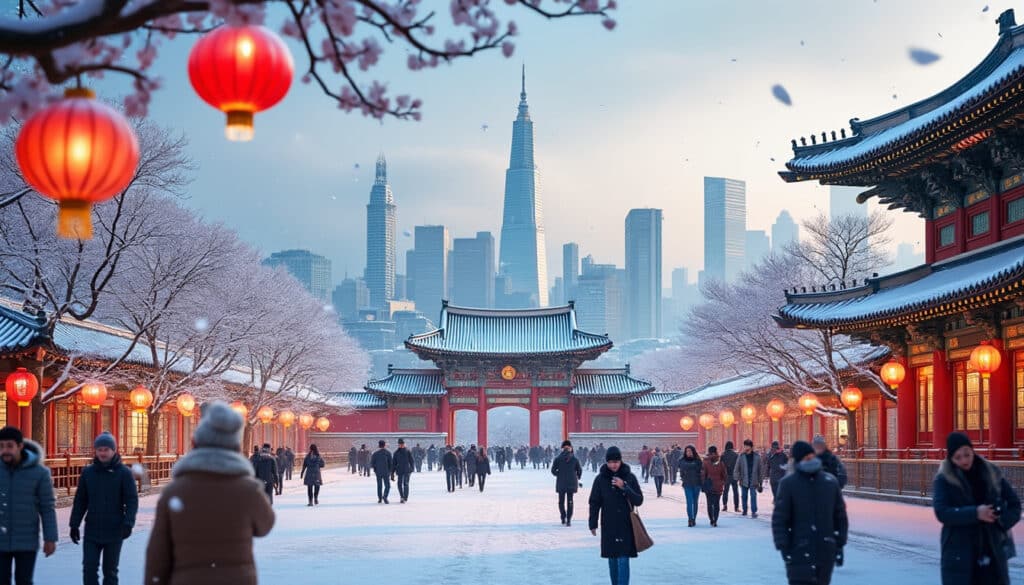
When imagining Seoul in winter, visions of snow-dusted palaces, serene parks, and bustling streets adorned in festive decorations might come to mind. But does it truly snow in Seoul? While South Korea’s capital city does experience winter weather, it doesn’t…
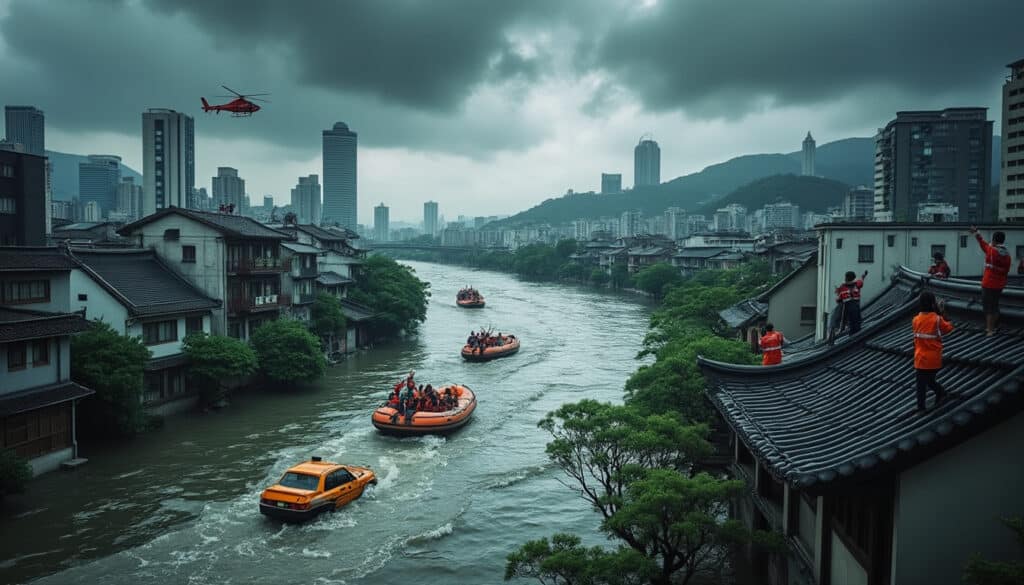
Flooding and natural risks in Seoul
Seoul, the bustling heart of Korea, is not without its challenges. As the city juggles rapid urbanization and meteoric technological advances, it also faces the formidable threats of flooding and other natural risks. Dubbed as one of the “Mega Cities”,…
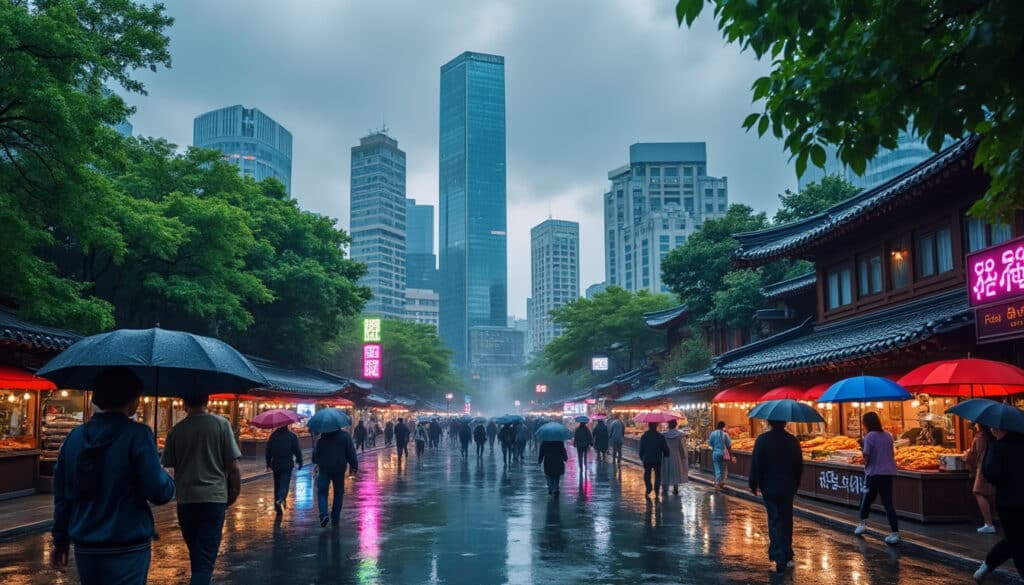
When one thinks of Seoul, the vibrant capital of South Korea, they might envision bustling streets, cutting-edge technology, and a rich blend of modern and traditional culture. However, nestled within these urban delights is a lesser-discussed yet crucial aspect: the…
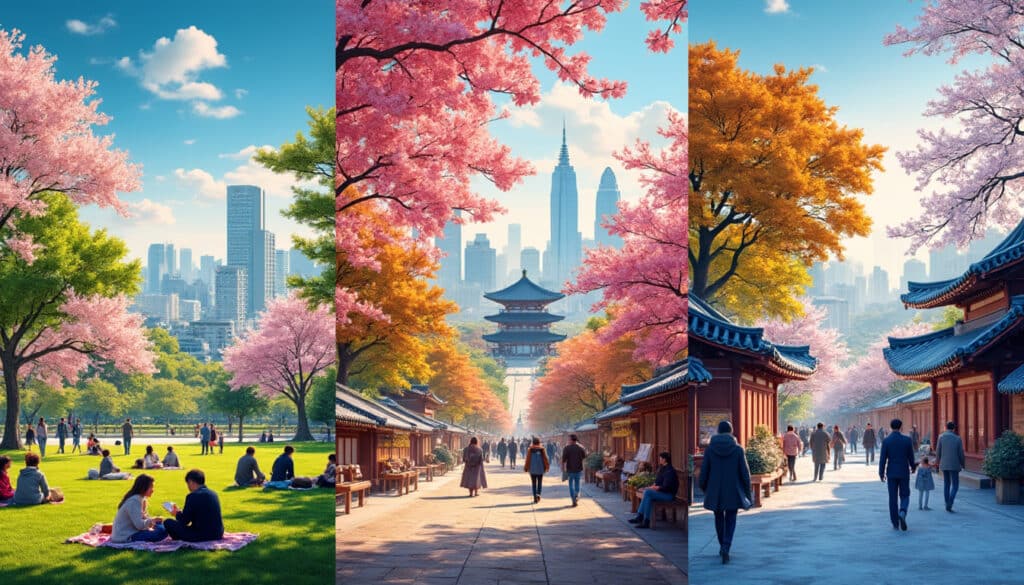
Is Seoul warm throughout the year?
Seoul, the dynamic capital of South Korea, is known for its rich culture and vibrant cityscape. Yet, it also presents a diverse climate that varies significantly across the year. Understanding Seoul’s weather patterns is essential for prospective travelers, businesses like…

Seoul, the vibrant capital of South Korea, presents a captivating blend of ancient traditions and bustling modernity. In this city where time seems to stand still and rush forward simultaneously, experiencing the beginning of a new day at sunrise is…
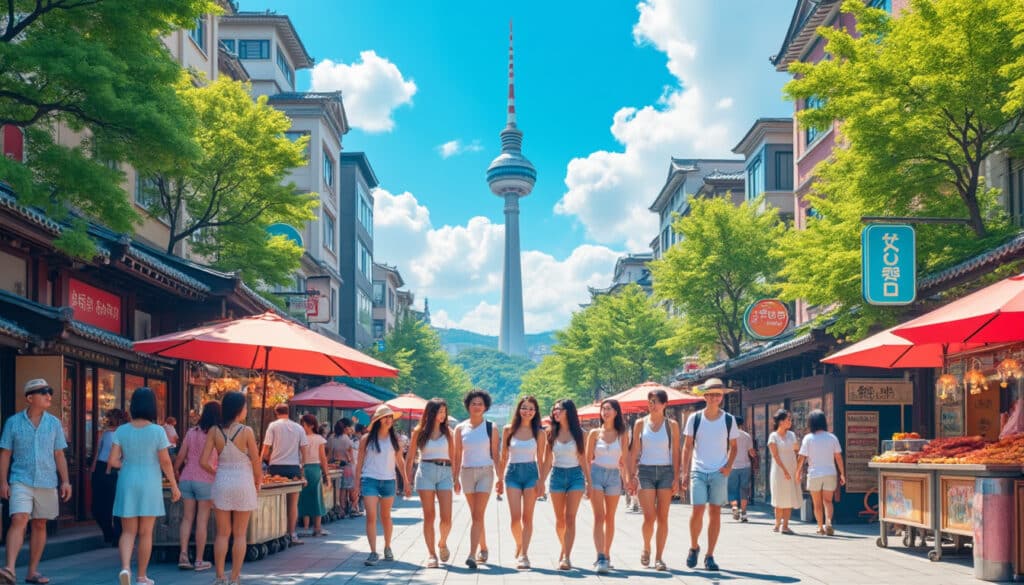
As the vibrant cityscape of Seoul continues to captivate travelers and residents alike, understanding its temperature trends becomes essential for planning visits and daily activities. The city, known for its unique blend of tradition and modernity, offers a distinct climate…
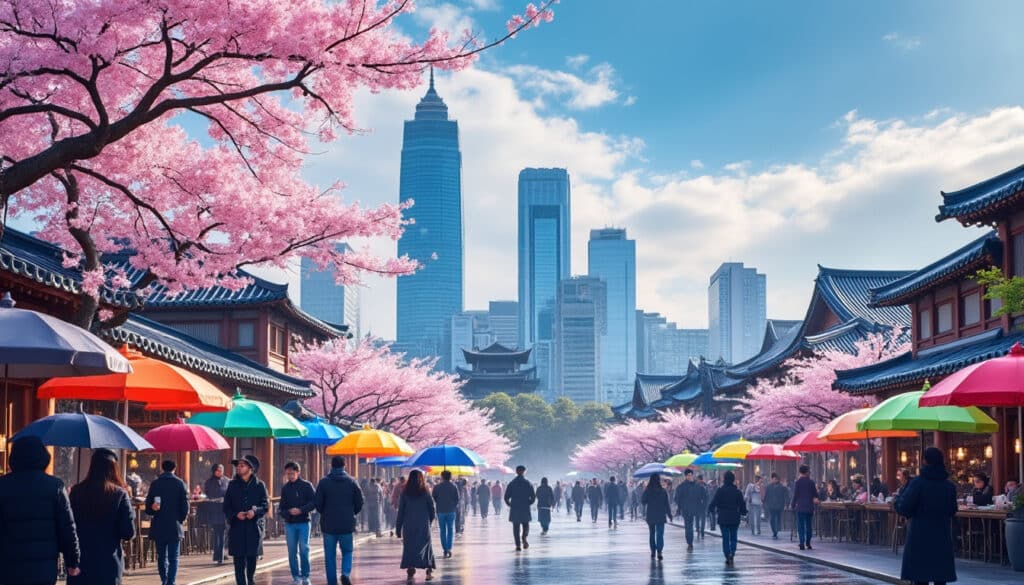
What is the weather like in Seoul?
Seoul, a bustling metropolis with a perfect blend of ancient traditions and modern innovations, often leaves its visitors and residents curious about its weather patterns. While the city is famous for its historic palaces, cutting-edge technology, and mouth-watering cuisine, understanding…
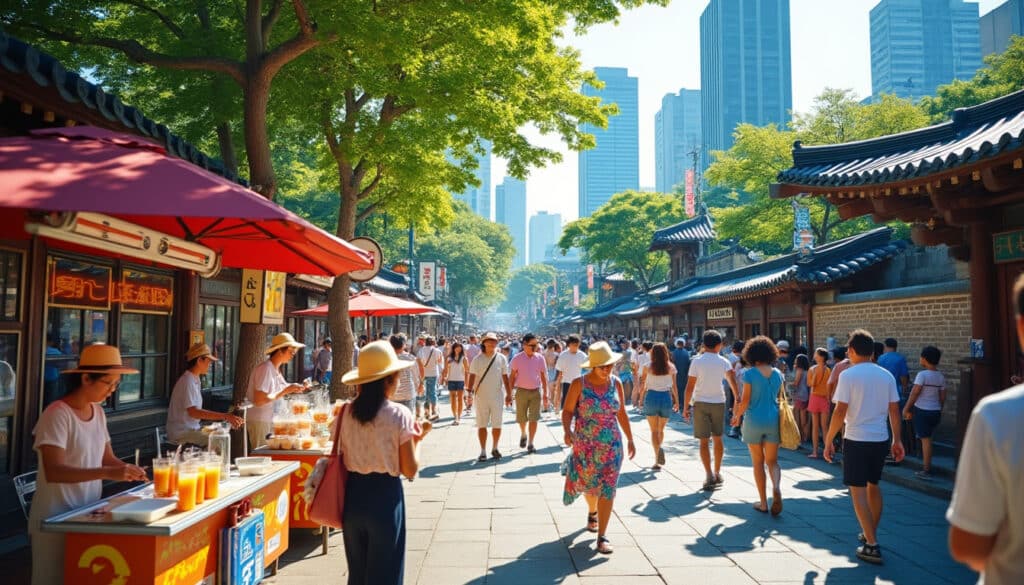
Seoul, a vibrant city known for its mix of traditional culture and modern innovation, transforms under the blazing summer sun. With its hot and humid climate, Seoul during summer is a true testament to the concept of endurance and adaptation.…

